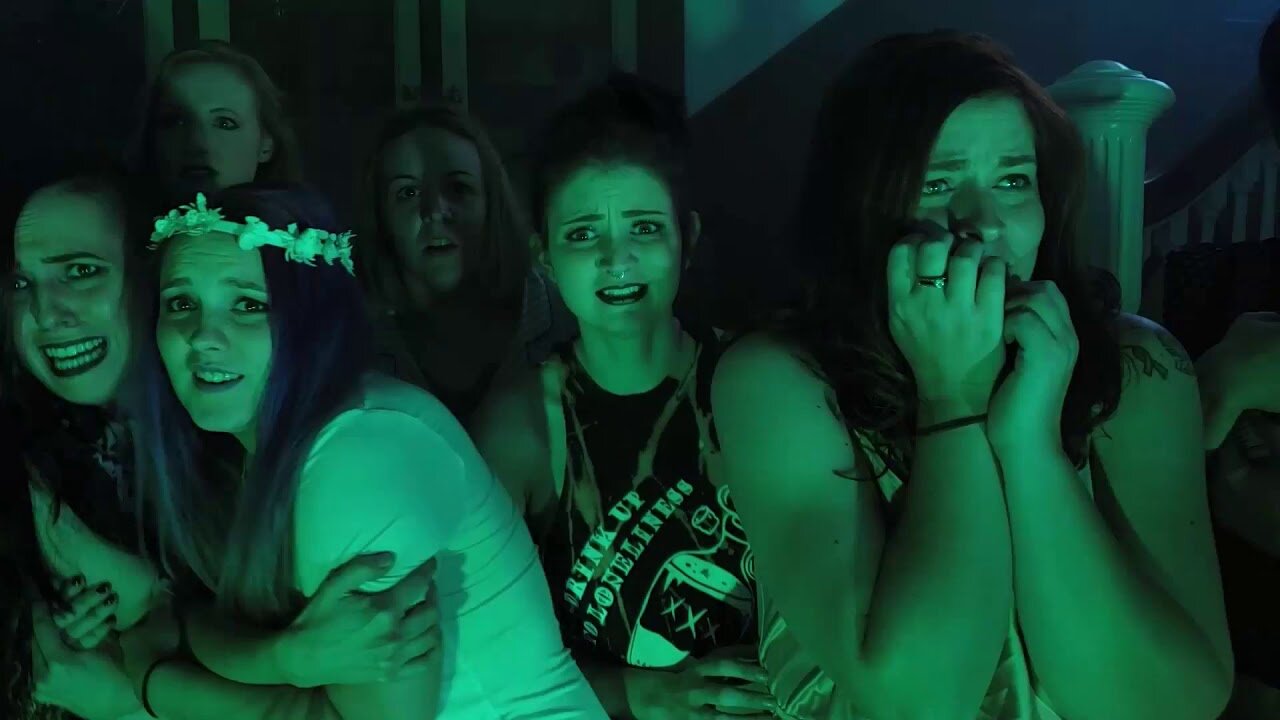[Pride 2020] Passive Homophobia And Its Effect On Their LGBTQIA+ Audience
Growing up I never fit in. Shocker, I know. A horror fan feeling like an outsider. What an original take, right?! Unlike a lot of horror nerds, it wasn’t just because of my interest in all things macabre, there was more to it than just my taste in film, television, and literature. I held onto a secret from the age of 10 to 19 that ate me up inside.
It wasn’t until college that I felt safe enough to come out as gay.
Regardless of anybody actually knowing my sexually orientation, I was still called “gay, fag, faggot, or queer” every day of school. It was meant to be demeaning and crush my spirit. I would be a liar if I tried to say that I didn’t use the same insults towards other fellow students. Such harsh and hate filled language had become accepted in common vernacular as an affront that relegated homosexuality to being lame. This is what is known as passive homophobia.
My escape from the verbal belittling was genre film, specifically horror movies. Every chance I got I would rent horror films that I had wanted to see just from the cover art on the box. Some were good, and some were bad, but I loved all of them. What always stung, was when characters would use homophobic slurs to put down each other. My escape then would ground me in reality and the disappointment and self-loathing would set in again.
As a fan of director Fred Dekker’s films, it hurt the most to see character’s in his movies flippantly use homophobic epitaphs as insults. How does the line “…why don't they tell you about the homos...” help out the story of Monster Squad? Maybe he was trying to hold onto the authenticity of the characters, but when a film about pre-teens battling classic monsters has passive homophobic dialogue in it, it will affect young impressionable minds. I was 9 years old when I first saw Monster Squad, and I’m positive that that line had a negative impact on my psyche. I was glad to see this dated dialogue was addressed in the Monster Squad documentary Wolfman’s Got Nards.
This type of passive homophobia was rampant in the 1980’s with the argument of, “well, when people talk, they talk like that.” You could see it in everything from Teen Wolf to The Toxic Avenger. To me that excuse just comes across as a reckless use of influence and lazy writing. Art may imitate life, but life also imitates art. If society views this kind of language as acceptable in their media, then it helps to become acceptable in actuality. This demoralizes and humiliates the viewer.
It wasn’t until 2003, when as an adult horror fan, this phenomenon of passive homophobia disturbed me so much that the one time use of the word “faggot” ruined an entire film that I had waited my whole life to see. In director Ronny Yu’s slasher show down Freddy vs. Jason, Kelly Rowland’s character Kia Waterson debases Freddy with the line,” So you're the one everyone's afraid of? Tell me something. What kind of faggot runs around in a Christmas sweater? I mean, come on, get real. You're not even scary.” I could overlook the hack stoner humor in the movie, and the sub-par CGI effects, but once that one demonizing line was uttered it was time for me to walk out of the theatre.
At that point in my life, I had been out as a gay man for 6 years. So, to see genre movie characters use a hateful quip like that left such a sour taste in my mouth. I’m sure to the rest of the theater audience it didn’t mean anything. To me it meant the death of my beloved Nightmare on Elm Street and Friday the 13th franchises.
Coming into the later 2000’s and the rise of grindhouse throwback and torture porn movies sort of gave filmmakers carte blanche do be as raunchy as they want to be. No one filmmaker took more advantage of this more than director Eli Roth. It’s hard to think of a single horror film he’s made where passive homophobia, or in some cases blatant homophobia, isn’t proudly put on display. He has so much talent, I want to love his films. Then with each movie he makes he has to throw it all away with a line like “Activism is so fucking gay!” from Green Inferno.
Lately, passive homophobia has been mostly shunned from mainstream horror film. More socially conscious and diverse creative types involved in film making means more cultural sensitivity and more inclusion. You’ll find more of this passive homophobic writing in independent horror films trying to be edgy. This was a big reason I was turned off by Ghost Killers vs. Bloody Mary (Gayly Dreadful Review) and Slaughterhouse Slumber Party. Humor can be irreverent without being hurtful.
When cinema is created by people who have never been marginalized because of their sexual orientation, gender, or gender identity, we develop a tolerance for their mediocrity. If a filmmaker has a problem with the LGBTQIA+ community, I’d have a much more respect for them if they just said it, instead of telling their fans to “toughin’ up snowflake, that’s how people really talk”, which has been the case in the past.
These emotional scars that come from passive homophobia will never leave. As film fans, we should not be expected to pay money to be insulted. With a film genre that is being touted with how subversive and intelligent it can be, this lazy writing keeps it stagnant. I will promise, that as an openly gay film reviewer, I will denounce any movie that uses “fag, faggot, gay, dyke, or sissy” as a frivolous slur. Homophobia and transphobia have no place in horror. It’s an insult to the audience’s intelligence, and a put down to genre filmmaking all together.
Just don’t do it.


![[Pride 2020] Passive Homophobia And Its Effect On Their LGBTQIA+ Audience](https://images.squarespace-cdn.com/content/v1/5b39608d75f9eef54c62c3f0/1592794014122-9YU0ZSHP1UUC4AZS2LSL/kelly-freddyvsjason1.jpg)




![[Pride 2020] For Sean, From My POV As A Horror Fan](https://images.squarespace-cdn.com/content/v1/5b39608d75f9eef54c62c3f0/1593484114370-B09RZEZ6FWKW8TFIG0NA/Sean%2Bpic%2B1.jpg)
![[Pride 2020] Finding Jennifer; Or, How I Learned to Stop Hating Jennifer's Body](https://images.squarespace-cdn.com/content/v1/5b39608d75f9eef54c62c3f0/1593483718013-3AP23VJDN9V0MMA6V3DU/51d02d6fb673bec72cb41a366c86bb39.jpg)
![[Pride 2020] Good Manners Deconstructs Class and Racial Disparities in Brazil](https://images.squarespace-cdn.com/content/v1/5b39608d75f9eef54c62c3f0/1593398398356-6QRX0G4PK4S87TKTMF0T/1270796_goodmanners_432313.jpg)
![[Pride 2020] The Power Of Difference In Hellraiser's Queerness](https://images.squarespace-cdn.com/content/v1/5b39608d75f9eef54c62c3f0/1593397752213-22GFO5I1QW8I220F5MZM/hellraiser_hed.jpg)
![[Pride 2020] Love, Trauma And Horror](https://images.squarespace-cdn.com/content/v1/5b39608d75f9eef54c62c3f0/1593323224833-38FH4ANZTM88LXS5HG5M/Hush.jpeg)
![[Pride 2020] A Lance in the Throat: Scary Heteros in Almodóvar’s “Matador”](https://images.squarespace-cdn.com/content/v1/5b39608d75f9eef54c62c3f0/1593322407370-GXK7L0BP0D7QNTN1FFPE/ede3ca1c-1165-11e8-9ac6-bbf931a203ee4.jpeg)
![[Pride 2020] The Mischa Project](https://images.squarespace-cdn.com/content/v1/5b39608d75f9eef54c62c3f0/1593231688339-UJSAXF4NN6K1ETEK9EBS/41000240.jpg)
![[Pride 2020] Another Cheater](https://images.squarespace-cdn.com/content/v1/5b39608d75f9eef54c62c3f0/1593230510967-BTX8BAR5VDNNJO58OW7V/knife.jpg)
![[Pride 2020] Extreme Horror And Queer Affirmation In Martyrs](https://images.squarespace-cdn.com/content/v1/5b39608d75f9eef54c62c3f0/1593140634217-BSFPGD1GVAV693B06Q1X/film_martyrs.jpg)
![[Pride 2020] "And I Still Don't Even Know How I Even Survive": Navigating Hard Times With Happy Death Day 2U](https://images.squarespace-cdn.com/content/v1/5b39608d75f9eef54c62c3f0/1593140172444-2JM3W35YYCJ9803EETB7/maxresdefault.jpg)
![[Pride 2020] Life Against The Dark: Growing Up And Coming Out With Hill House's Theodora](https://images.squarespace-cdn.com/content/v1/5b39608d75f9eef54c62c3f0/1593047800584-A79Y39E6S4OIURNI63GS/IMG_1438.JPG)
![[Pride 2020] Outside Of Laramie: Joy Ride (2001) As Gay Panic Horror](https://images.squarespace-cdn.com/content/v1/5b39608d75f9eef54c62c3f0/1593046627243-BQQZOWPMVE2TZKCYT90Z/519yvHX-bLL._AC_.jpg)
![[Pride 2020] A Bumpy Road Of Queer Gothic Resistance From The Old Dark House To The Rocky Horror Picture Show](https://images.squarespace-cdn.com/content/v1/5b39608d75f9eef54c62c3f0/1592959865412-WZQ8BTV28SHJX1WHEYK5/rocky-horror-sequel-01.jpg)
![[Pride 2020] Why Bisexual Representation In Jennifer's Body Matters](https://images.squarespace-cdn.com/content/v1/5b39608d75f9eef54c62c3f0/1592959284705-3SMVYNT4ZMWN0QADZJDB/jennifers-body.jpg)
![[Pride 2020] A Tribute To Kevin Williamson](https://images.squarespace-cdn.com/content/v1/5b39608d75f9eef54c62c3f0/1592881451514-Y4OPAHSXUI63FH3T7TB2/lockwood_williamson2.jpg)
![[Pride 2020] The Power Of The Trans Monster In Bit And Switch](https://images.squarespace-cdn.com/content/v1/5b39608d75f9eef54c62c3f0/1592880971405-NFCCXW50AVB1PIPZQZVW/MV5BOWE0YjFhYTUtMWE2Zi00OWJkLTg2MzItY2VlYzUxMWE4YTM3XkEyXkFqcGdeQXVyMjE5MzYzNjU%40._V1_.jpg)
![[Pride 2020] There's A Monster At The End Of This Essay](https://images.squarespace-cdn.com/content/v1/5b39608d75f9eef54c62c3f0/1592793247165-0IRK6TCXUYLCYN41EGH5/sesame-street-the-monster-at-the-end-of-this-book-9780794440237.in01.jpg)
![[Pride 2020] Bisexuality in Genre: How Catherine Tramell Warped Sexuality Forever](https://images.squarespace-cdn.com/content/v1/5b39608d75f9eef54c62c3f0/1592708306869-A25JKBJ9WESFNUM9EFZJ/6bee9e40b42062fb5a4456c27a31b2e0.jpg)
![[Pride 2020] How Evil Dead 2 Helped A Trans Girl Find Herself](https://images.squarespace-cdn.com/content/v1/5b39608d75f9eef54c62c3f0/1592707596758-2ANPLJK8JEY9XX3HTCH4/0a1ccb15-21f6-4dc9-b1b6-635c40e0046e_1.e6d75d0b581b65da70719cdba2fd46d5.jpeg)
![[Pride 2020] The Spirit Of Thomas Carroll](https://images.squarespace-cdn.com/content/v1/5b39608d75f9eef54c62c3f0/1592624295460-BJ42D5K1DFKXCFRKN7KI/pexels-photo-1671325.jpeg)
![[Pride 2020] Sickos Never Scare Me](https://images.squarespace-cdn.com/content/v1/5b39608d75f9eef54c62c3f0/1592543280046-WRDU1JSIN3JB4W7OJUGB/catwoman-700x500.jpg)
![[Pride 2020] Lovecraft, Horror And Questioning Sexuality](https://images.squarespace-cdn.com/content/v1/5b39608d75f9eef54c62c3f0/1592542591836-SJXZY6P0OZUKZY8R1F6E/cthulhupostbig.jpg)
![[Pride 2020] In Defense Of And Against Richie's Secret In It: Chapter 2](https://images.squarespace-cdn.com/content/v1/5b39608d75f9eef54c62c3f0/1592457692112-AKTBKSAQ9GSR1DI8HIX9/5ca22ee726a592e1c6c4b42b379af52b9d6f09f5.jpg)
![[Pride 2020] Bloodthirsty Villains And Homicidal Maniacs...But Make It Gay](https://images.squarespace-cdn.com/content/v1/5b39608d75f9eef54c62c3f0/1592457031919-F7C0J9H77JJQ4H0S69KT/630e2b1afaaafb06d9728b9627532756.jpg)
![[Pride 2020] A Life Changing Excision](https://images.squarespace-cdn.com/content/v1/5b39608d75f9eef54c62c3f0/1592359171589-LWRXA6B3UHFSBL4WXIB4/Excision-Pic-2-800x330.png)
![[Pride 2020] Drag Me to Hell: An Incomplete History of the Intersection of Drag and Horror](https://images.squarespace-cdn.com/content/v1/5b39608d75f9eef54c62c3f0/1592358005266-TM3GTK2Q0UHANROZKE29/Nightclub+of+the+Living+Dead.png)
![[Pride 2020] From Villains To Heroes: Imperfect Women In Horror](https://images.squarespace-cdn.com/content/v1/5b39608d75f9eef54c62c3f0/1592267521002-M5YENUAM359R1LFXRKDK/intro-1514398906.jpg)
![[Pride 2020] "I always thought the only alien in this high school was me" - Navigating Identity In The Faculty](https://images.squarespace-cdn.com/content/v1/5b39608d75f9eef54c62c3f0/1592266793030-0M18Z90CRBEF2LDW3178/5142466d6f362f188229058788d9af42.jpg)
![[Pride 2022] Freddy Krueger's Christmas Sweater: On Kelly Rowland, cigarette emojis, and the American Flag](https://images.squarespace-cdn.com/content/v1/5b39608d75f9eef54c62c3f0/1655780859540-0L9SR4EF2IT93HWEEMJD/kelly-freddyvsjason1.jpg)